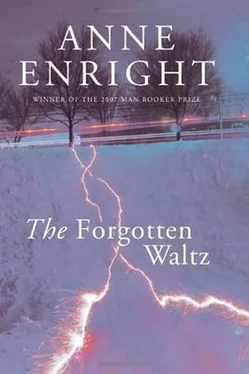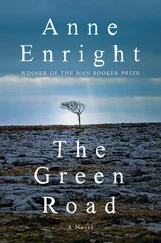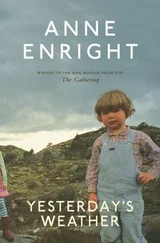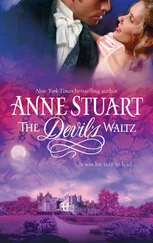I don’t think I told Seán all that much about him, though he was quite interested in the lives we led after Daddy died: the Moynihan women, all dressed in black. He really liked the sisters thing, he wanted – I don’t know – teenage details; snogging at the corner, disasters with underwear. He liked the idea of us growing up; myself and Fiona causing a stir, as he put it, in the pants of every boy in Terenure.
He talked about his mother quite a lot. I mean, it was clear I would never have to meet this woman, he could say whatever he liked. I would not have to listen – the way you do – to tales of tenderness or brutality, and then shake some old woman’s hand, to discover that she was quite ordinary, really: a bit dimmer than you expected, or sharper, but surprisingly faded and human, though not always – as I recall from other women I have heard described by naked men – entirely nice. Anyway, he told me about his mother, the way Conor used to do and before that, Fergus, and before that, Axel from Trondheim, who called his mother ‘Meen Moooor’ and before that various others, though my virgin years were mostly spared. After sex, that is when men talk about their mothers; before sex they are a little affronted by the mention of her. As for daughters; my experience of sleeping with fathers is limited, but I suspect that daughters are only discussed when everyone is fully dressed. Daughters are discussed in the morning light. Or they are not discussed at all. I mean that they are completely irrelevant and completely forbidden, both at the same time.
Don’t go there .
OK. Fine.
But I am becoming distracted from the subject of Margot, Seán’s mother, the bank manager’s wife and Sunday painter, who drank an actual martini every day at half past five, and was not a beauty, though she considered herself to have an Interesting Face.
‘Thin?’ I said.
‘As a rake,’ he said. ‘Hands like,’ and he made the same swirl and grab of the air, that I had seen and loved, that time in Montreux.
‘Of course,’ I said.
Seán’s mother needed space to grow as an artist and a human being, and Seán’s father moved around every few years on his way up the ladder of the Bank of Ireland, so Seán was packed off to boarding school at the age of twelve – and not a posh boarding school, at that, but the kiddy-fiddlers down in Wexford, where they beat the shit out of you, and didn’t even bother to teach you French.
But the school was fine – no one touched him, one way or the other – there was nothing terribly wrong with the school. It was the mother and her daubings, that was the problem; it was Margot and her ‘needs’. The day he got his exam results she decided it was time that she too went to college, and he spent the entire summer dreading UCD where his mother, as he thought, would be holding court in a corner of the student bar. In the event, she decided on art college instead, then changed her mind and wanted to study counselling.
‘And did she?’
‘Did she what?’ said Seán. ‘Did she shite .’
I thought she sounded quite interesting in a way. I was almost sorry I would never look her in the eye. Or that, if I did look her in the eye, she would not know who I was:
‘What wonderful watercolours, Mrs Vallely. Don’t tell me you did them all yourself.’
The affair, as I had learned to call it, progressed in its Friday pace. The sex became less filthy and more fun, the silence filled with talk – laughter even – and this unsettled me. I might have preferred silence. Every normal thing he said reminded me that we were not normal. That we were only normal for the twelve foot by fourteen of a hotel room. Outside, in the open air, we would evaporate.
I bumped into him one evening in March. I was with a client, a plastics guy from Bremen, with a Plattdeutsch accent like someone walking in shoes three sizes too big for him. It was not a glamorous evening. We ended up in Buswells for a nightcap and there was Seán with some suits in the corner, being the thing – the way men can do that, somehow – making money just by being himself.
I took a long route to the ladies in order to pass near him, and we had a funny, offhand little exchange. There he was. Dressed. Polite. He asked about work. I answered him. He turned back to the suits and I went on to the toilets, where I started to shake so badly I could not open my bag to get a brush. I stood for a moment, trying to breathe. Then I washed my hands, and dried them carefully, with the little white towel. I touched the mirror where my face was, I pressed quite hard on the glass, then I went back in to my plastics man.
I was thirty-two. I remembered that fact, as I sat back down and looked about me. Apart from the waitresses, I was the youngest person in the room.
After the Buswells incident, I became petulant, hard to manage, and so we played that game for a while; the mistress game. He bought me a Hermès scarf – I mean, I am not a Hermès kind of girl – he produced it from behind his back after we kissed, like a man in a fifties film, and I said, ‘Did you keep the receipt?’
A fortnight later, he produced a bottle of perfume from the same magical spot. It was a light, harmless kind of scent called Rain, and indeed it smelled a little of the rain, starting soft and warm on your skin (is there a perfume called Skin, I wondered), then opening to an afterwash of fresh air. I liked it well enough, though the end note was a bit like that chemical waft you get from tumble dryer sheets, that is supposed to remind you of clothes hung out on the line.
I set it down on the bedside locker but Seán picked it up again and sprayed some on the back of my neck before undressing me and the sex afterwards was hard to judge, somehow; a little intense and laboured on his part and, on mine, distracted at every turn by the artificial smell of rain in the room.
‘Rain,’ I said. ‘What made you buy that?’
‘I just thought you’d like it.’
‘I do,’ I said.
I am not a fake sort of person, but afterwards, in the smell of fabric freshener and sad, rainy days, I traced the lines around his eyes, and said, in a way that sounded fake, even to me.
‘Have you done this before?’
It was the perfume that maddened me.
‘Done what?’
I am not the kind of woman who wears Rain.
‘All this. Have you done it before?’
‘Well, you know,’ he said.
When we met the next week, I wore my black suede boots with the fringe down the back seam, and I sat in the chair and crossed my legs and told him it was time to make an end. And after he agreed, and seduced me, and I resisted and then cried (just a little), he told me about the other girl, the first one. She was someone at work, he said. She was someone he had actually hired, at work, so go figure, but unbelievably it did not occur to him, except in a ‘wouldn’t mind’ sort of way, and anyway he wasn’t…
‘What?’ I said.
He just wasn’t free. That was the bottom line. But something about her, slowly, something about her just broke him, the way she was, she had a thing for nail varnish, these tiny hands and her nails were done in all these bubblegum colours, they looked like sweets.
‘And?’ I said.
Well she was twenty-two, which, you know, looks great, but it was the emotion that sideswiped him, it came from nowhere. And she was twenty-two. So he was in love – he thought he was in love – and he had forgotten how it is at that age but she was really hard work. She wasn’t thick, exactly – she still, God knows, went on about her B in Honours Maths – but she gave a very good impression of thick, talking about herself all the time, obsessing about her thighs, throwing things at him if he said the wrong, nice thing about her thighs.
Читать дальше












